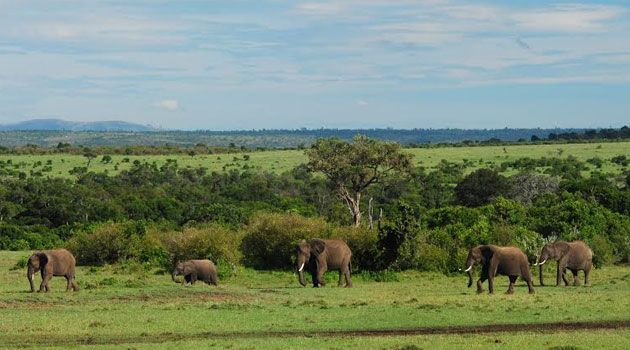
The document released on July 1 opposes proposals to protect elephants submitted by African countries to the 17th Conference of the Parties (CoP17) of CITES (the Convention on International Trade in Endangered Species of Wild Fauna and Flora) in September-October in Johannesburg, South Africa/FILE
NAIROBI, Kenya, Jul 21 – Fifty-nine Non Governmental Organisations and individuals from around the world are now calling upon their governments to respect the will of the majority of African elephant range states in efforts to overcome the scourge of poaching.
Proposals outlined in a recent EU policy paper have astounded conservationists, who are calling on governments across Europe to respect the will of the majority of African elephant range states.
The document released on July 1 opposes proposals to protect elephants submitted by African countries to the 17th Conference of the Parties (CoP17) of CITES (the Convention on International Trade in Endangered Species of Wild Fauna and Flora) in September-October in Johannesburg, South Africa.
CITES is a global treaty established to ensure international trade does not threaten the survival of wild animals and plants.
The 28 member states of the EU comprise its biggest voting bloc and its funding and trade levers afford it powerful influence in the developing world, but the position paper issued by the European Commission on July 1, which opposes the transfer of elephants in Botswana, Namibia, South Africa and Zimbabwe to Appendix I (“prohibiting all international commercial trade in ivory”) while backing the current temporary moratorium on ivory trade and system of exemptions, has left conservationists and many African countries astonished.
“The current position from the European Commission is both unexpected and unwelcome;” said the President and CEO Born Free Foundation Will Travers, and Chair of the Elephant Working Group – Species Survival Network.
“As a migratory species with populations shared by many countries elephants have to be considered on a continent wide basis. It defies common sense, not to mention the weight of public support to protect the species.”
In the last 33 years 61 percent of Africa’s elephants have been lost as a result of the ivory trade.
Recognising the huge threat posed by the trade, the African Elephant Coalition (AEC), a group of 29 African nations including 70 per cent of range states, are proposing:
– The listing of all African elephants in CITES Appendix I,
-The closure of domestic ivory markets,
-The destruction of ivory stockpiles,
-Ending the Decision-Making Mechanism (DMM) for legalizing the trade in ivory, and
-Limiting the export of wild, live African elephants.
They believe that this package of five proposals will end the ivory trade and afford elephants the highest protection under international law.
The United States has implemented a near total ban on the domestic ivory trade.
China has banned imports and will release a timetable to close its domestic market by the end of 2016.
Hong Kong has announced it will close its market and both France and Angola have announced a domestic ivory ban.
In the UK, the Conservative Government has made a specific manifesto commitment to end the ivory trade.
“The international community, including the EU, has signed several high-level government declarations which call for an end to wildlife trafficking, closure of domestic markets and support for initiatives to reduce demand, so the European Commission’s recent position opposing the package of proposals to protect elephants, disregarding the views of the vast majority of African elephant range states and public opinion, is of deep concern,” adds Co-Founder of Pro-Wildlife and European Co-Coordinator – Species Survival Network Daniela Freyer.
“The European Union must send a crystal clear signal that the ivory trade is unacceptable and that the African elephant deserves the highest level of international protection possible,” said Vera Weber, President and CEO of Foundation Franz Weber.









































